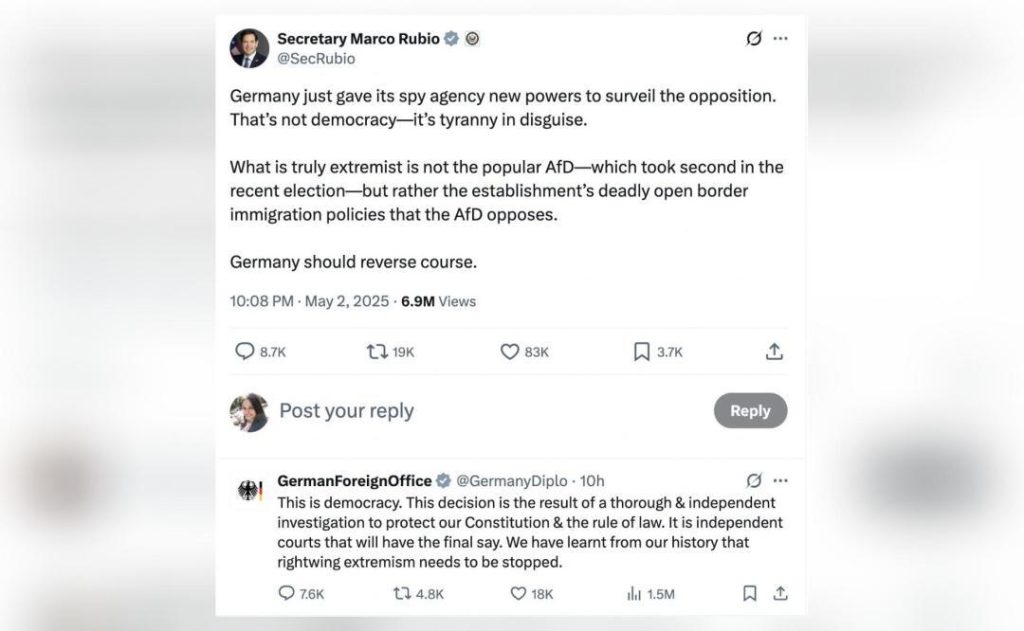
US Secretary of State Marco Rubio and German Foreign Ministry Clash Over AfD Party’s ‘Extremist’ Tag
The ongoing debate over the extremist nature of Germany’s far-right Alternative for Germany (AfD) party has taken a contentious turn, with US Secretary of State Marco Rubio and the German Foreign Ministry engaging in a heated exchange. The spat began after Germany’s domestic intelligence agency, the Federal Office for the Protection of the Constitution (BfV), labeled the AfD party as “extremist” due to its anti-immigrant and anti-Muslim rhetoric.
Rubio, who has been a vocal critic of the AfD party, accused Germany of enabling “tyranny in disguise” by not taking stronger action against the party. In a tweet, he wrote, “Germany’s decision to label the AfD as ‘extremist’ is a hollow gesture. By not taking concrete action to prevent the AfD from spreading hate and intolerance, Germany is enabling tyranny in disguise.”
The German Foreign Ministry responded to Rubio’s remarks, saying that the decision regarding the AfD party was the result of a thorough investigation to protect Germany’s Constitution. A spokesperson for the ministry stated, “The BfV’s decision is based on a comprehensive analysis of the AfD’s activities and statements. It is a result of thorough investigation to protect our Constitution.”
The AfD party, which has been a significant force in German politics since its establishment in 2013, has been criticized for its anti-immigrant and anti-Muslim rhetoric. The party’s leaders have made statements that have been deemed offensive by many, including comparisons between migrants and “invasive species.”
The BfV’s designation of the AfD party as “extremist” is not the first time that the party has faced criticism. In 2019, German Interior Minister Horst Seehofer banned the party’s youth wing, citing its anti-Semitic and xenophobic views.
The US government has been a vocal critic of the AfD party, with Rubio and other lawmakers expressing concerns over the party’s ideology and its potential to promote hate and intolerance. In 2020, Rubio introduced a resolution in the US Senate condemning the AfD party’s anti-Semitic and anti-Muslim rhetoric.
The clash between Rubio and the German Foreign Ministry over the AfD party’s “extremist” designation is the latest in a series of tensions between the two governments. In recent years, there have been disagreements over issues such as trade, climate change, and human rights.
The controversy surrounding the AfD party is not limited to Germany. The party has been the subject of international scrutiny, with many governments and organizations expressing concerns over its ideology and activities.
The European Union has been a vocal critic of the AfD party, with EU officials warning that the party’s anti-immigrant and anti-Muslim rhetoric could undermine the values of tolerance and diversity that are at the heart of the EU’s founding principles.
The United Nations has also expressed concerns over the AfD party’s ideology, with UN Secretary-General António Guterres stating that the party’s views are “incompatible with the principles of human rights and dignity.”
In conclusion, the clash between US Secretary of State Marco Rubio and the German Foreign Ministry over the AfD party’s “extremist” designation highlights the ongoing debate over the nature of the party and its potential to promote hate and intolerance. While some have argued that the party’s views are incompatible with the values of democracy and human rights, others have defended the party’s right to free speech and political expression.
As the debate continues, it is clear that the AfD party is a complex and controversial force in German politics. While some have expressed concerns over the party’s ideology and activities, others have argued that the party is a legitimate political force that has a right to exist and express its views.
Ultimately, the clash between Rubio and the German Foreign Ministry over the AfD party’s “extremist” designation serves as a reminder of the ongoing challenges and complexities of modern politics. As governments and organizations around the world continue to grapple with the rise of extremism and hate speech, it is clear that the debate over the AfD party’s ideology and activities will continue to be a contentious and complex issue.



